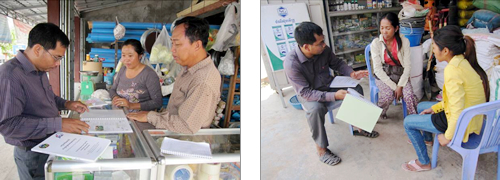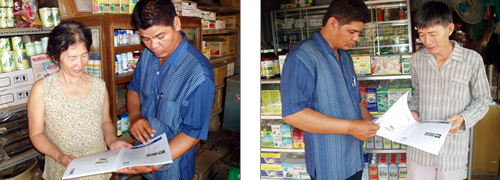- Home
- Technical Cooperation Projects
- Index of Countries
- Asia
- Cambodia
- Capacity Building for the Quality Standard Control of Agricultural Materials (Chemical Fertilizers and Pesticides)
- Project News
- "Guide Book for Pest Management (Part 2)" finally completed!
Project News
2012-03-23
"Guide Book for Pest Management (Part 2)" finally completed!
The Project of Capacity Building for Quality Standard Control of Agricultural Materials (Chemical Fertilizers and Pesticides) – QCAM Project – distributed the Guide Book for Pest Management[1] to the licensed pesticide shops in the pilot areas, the Kien Svay and Koh Thom Districts of Kandal Province in August 2011. The Guide Book for Pest Management (Part 2), a supplementary document to the Guide Book for Pest Management, was started to be produced in September 2011 with five licensed dealers and agencies of agricultural materials, and finally completed. QCAM project distributed the Guide Book to the licensed pesticide shops in the pilot areas in March 2012.
The Guide Book for Pest Management identifies major pests for rice and Chinese cabbage (both are commonly grown in the pilot areas), and introduces the Integrated Pest Management (IPM)[2] methods by following the guidelines of Ministry of Agriculture, Forestry and Fisheries (MAFF) in Cambodia. The Guide Book also indicates applicable active ingredients of pesticides against various pests to be used as a last resort if the IPM methods do not work effectively. Referring to the applicable active ingredients of pesticides identified in the Guide Book for Pest Management, the Guide Book for Pest Management (Part 2) introduces 38 registered pesticide products of the five licensed dealers and agencies and clearly explains the usage and precautions of every pesticide product using the label format recommended by the Food and Agriculture Organization (FAO) and the ASEAN countries. Furthermore, as is the case in the Guide Book for Pest Management, there are numerous photos of the pesticide products, target crops and pests included in the Guide Book for Pest Management (Part 2), so that more farmers can properly select the pesticide products.
 Staff of Provincial Department of Agriculture (PDA) explaining about the Guide Book for Pest Management (Part 2) to the licensed pesticide shops in Kien Svay District.
Staff of Provincial Department of Agriculture (PDA) explaining about the Guide Book for Pest Management (Part 2) to the licensed pesticide shops in Kien Svay District.
In Cambodia, since most pesticides have been brought from Vietnam and Thailand and sold with the foreign language labels, most retailers and farmers have been forced to sell or use them without understanding their proper usage and effects. At the same time, as there are not any manufacturers of chemical fertilizers and pesticides in Cambodia, there was no close cooperation between the MAFF and the private sector of the agricultural materials. Therefore, at the beginning of the QCAM Project, the concept of "Corporate Social Responsibility" on proper management of agricultural materials was not yet familiar to most people in the government or the private sectors. In response to this challenging situation, the QCAM Project has repeatedly stressed the importance of the Public-Private Partnership (PPP) for the proper management of agricultural materials to counterparts of the Department of Agricultural Legislation (DAL) and the General Directorate of Agriculture (GDA). Three Technical Information Exchange Programs at the Fertilizer and Pesticide Authority in the Philippines were good opportunities for counterparts to realize the significance of the PPP.
 Staff of the PDA explaining about the Guide Book for Pest Management (Part 2) to the licensed pesticide shops in Koh Thom District.
Staff of the PDA explaining about the Guide Book for Pest Management (Part 2) to the licensed pesticide shops in Koh Thom District.
As a result, they understood the important role of the PPP in the management of agricultural materials, and proposed that the licensed dealers of agricultural materials establish Cambodia Agricultural Materials Traders Association (CAMTA) in October 2011. On March 27, 2012, the first general meeting will be held to officially establish the CAMTA. The QCAM project produced the Guide Book for Pest Management (Part 2) in collaboration with some of the licensed dealers and agencies that deal with agricultural materials.
It is hoped that this new movement of the PPP, promoted by the QCAM Project, will be further strengthened and become widely accepted in Cambodia by both the MAFF and the private sector so that illegal agricultural materials will be eradicated and the Cambodian people can enjoy security insofar as the use of agricultural products is concerned.
Finally, this will be the last edition of project news for the QCAM Project since the QCAM Project will be completed at the end of March 2012. We would like to convey our sincere thanks to all the supporters of the QCAM Project, and hope that Cambodia will continue developing to enrich the livelihood of the Cambodian people.
Written by Toshinori Hamaguchi, JICA Expert
Note
- [1] Please refer to the Project News of "Guide Book for Pest Management was Finally Completed" and "Awareness Raising Activities on Guide Book for Pest Management have been Launched"
- [2] FAO defines the IPM as "a pest-management system to discourage the development of pest populations to levels that are economically justified and maintain the levels by using all available pest control techniques and subsequent integration of appropriate measures."
- About JICA
- News & Features
- Countries & Regions
- Our Work
- Thematic Issues
- Types of Assistance
- Partnerships with Other Development Partners
- Climate Change / Environmental and Social Considerations
- Evaluations
- Compliance and Anti-corruption
- Science and Technology Cooperation on Global Issues
- Research
- JICA Development Studies Program / JICA Chair
- Support for the Acceptance of Foreign HRs / Multicultural and Inclusive Community
- Publications
- Investor Relations
